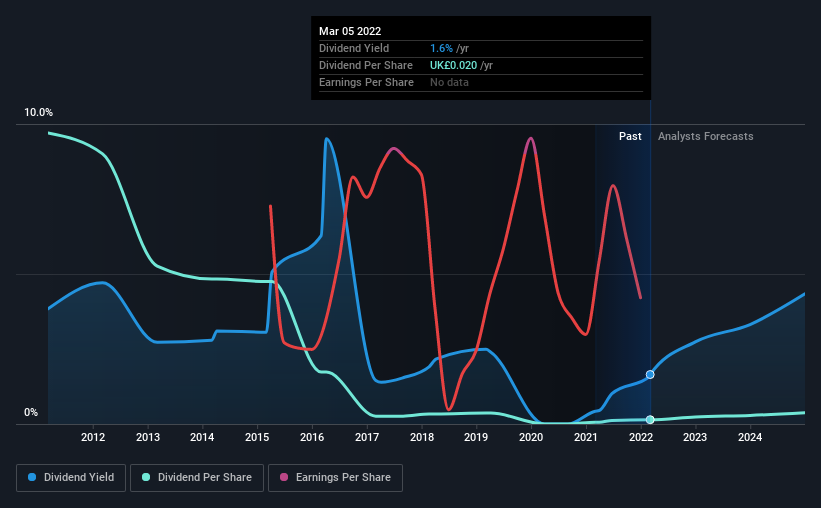- United Kingdom
- /
- Aerospace & Defense
- /
- LSE:MRO
Melrose Industries (LON:MRO) Will Pay A Larger Dividend Than Last Year At UK£0.01

Melrose Industries PLC's (LON:MRO) dividend will be increasing to UK£0.01 on 20th of May. This makes the dividend yield 14%, which is above the industry average.
Check out our latest analysis for Melrose Industries
Melrose Industries' Distributions May Be Difficult To Sustain
Impressive dividend yields are good, but this doesn't matter much if the payments can't be sustained. Melrose Industries isn't generating any profits, and it is paying out a very high proportion of the cash it is earning. These payout levels would generally be quite difficult to keep up.
Looking forward, earnings per share is forecast to rise by 34.5% over the next year. While it is good to see income moving in the right direction, it still looks like the company won't achieve profitability. Unless this happens fairly soon, the dividend could start to come under pressure.

Dividend Volatility
While the company has been paying a dividend for a long time, it has cut the dividend at least once in the last 10 years. Since 2012, the dividend has gone from UK£1.36 to UK£0.02. The dividend has fallen 99% over that period. Generally, we don't like to see a dividend that has been declining over time as this can degrade shareholders' returns and indicate that the company may be running into problems.
Dividend Growth Potential Is Shaky
With a relatively unstable dividend, and a poor history of shrinking dividends, it's even more important to see if EPS is growing. Earnings per share has been sinking by 11% over the last five years. A sharp decline in earnings per share is not great from from a dividend perspective. Even conservative payout ratios can come under pressure if earnings fall far enough. Over the next year, however, earnings are actually predicted to rise, but we would still be cautious until a track record of earnings growth can be built.
Melrose Industries' Dividend Doesn't Look Great
Overall, while the dividend being raised can be good, there are some concerns about its long term sustainability. The company's earnings aren't high enough to be making such big distributions, and it isn't backed up by strong growth or consistency either. The dividend doesn't inspire confidence that it will provide solid income in the future.
Market movements attest to how highly valued a consistent dividend policy is compared to one which is more unpredictable. However, there are other things to consider for investors when analysing stock performance. For example, we've picked out 1 warning sign for Melrose Industries that investors should know about before committing capital to this stock. Is Melrose Industries not quite the opportunity you were looking for? Why not check out our selection of top dividend stocks.
If you're looking to trade Melrose Industries, open an account with the lowest-cost platform trusted by professionals, Interactive Brokers.
With clients in over 200 countries and territories, and access to 160 markets, IBKR lets you trade stocks, options, futures, forex, bonds and funds from a single integrated account.
Enjoy no hidden fees, no account minimums, and FX conversion rates as low as 0.03%, far better than what most brokers offer.
Sponsored ContentNew: Manage All Your Stock Portfolios in One Place
We've created the ultimate portfolio companion for stock investors, and it's free.
• Connect an unlimited number of Portfolios and see your total in one currency
• Be alerted to new Warning Signs or Risks via email or mobile
• Track the Fair Value of your stocks
Have feedback on this article? Concerned about the content? Get in touch with us directly. Alternatively, email editorial-team (at) simplywallst.com.
This article by Simply Wall St is general in nature. We provide commentary based on historical data and analyst forecasts only using an unbiased methodology and our articles are not intended to be financial advice. It does not constitute a recommendation to buy or sell any stock, and does not take account of your objectives, or your financial situation. We aim to bring you long-term focused analysis driven by fundamental data. Note that our analysis may not factor in the latest price-sensitive company announcements or qualitative material. Simply Wall St has no position in any stocks mentioned.
About LSE:MRO
Melrose Industries
Designs and delivers aerospace components and systems for civil and defence markets in the United Kingdom, rest of Europe, North America, and internationally.
Reasonable growth potential and fair value.
Similar Companies
Market Insights
Community Narratives



